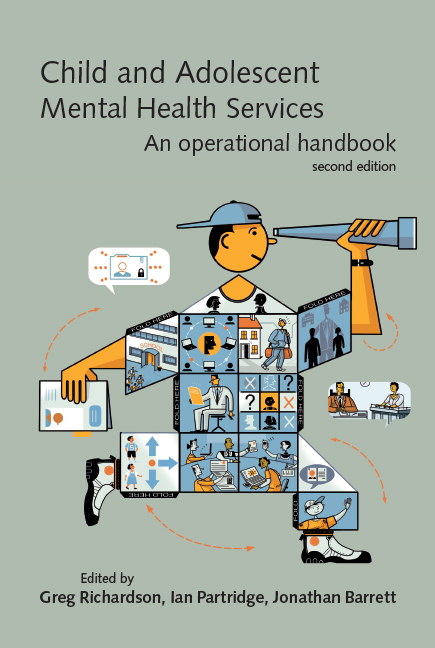Book contents
- Frontmatter
- Contents
- Tables, boxes and figures
- Contributors
- Abbreviations
- Preface
- 1 Introduction
- 2 CAMHS in context
- 3 CAMHS and the law
- 4 Structure, organisation and management of CAMHS
- 5 Evidence-based practice
- 6 Clinical governance
- 7 Education, supervision and workforce development
- 8 Multidisciplinary working
- 9 User and carer participation and advocacy
- 10 A comprehensive CAMHS
- 11 Referral management
- 12 Demand and capacity management
- 13 Strategies for working with Tier 1
- 14 Structuring and managing treatment options
- 15 CAMHS in the emergency department
- 16 Paediatric liaison
- 17 Self-harm
- 18 Learning disability services
- 19 Services for autism-spectrum disorders
- 20 Attentional problems services
- 21 Eating disorder teams
- 22 Bereavement services
- 23 CAMHS for refugees and recent immigrants
- 24 CAMHS and looked-after children
- 25 Drug and alcohol teams
- 26 Parenting risk assessment service
- 27 Court work
- 28 Tier 4 options
- 29 In-patient psychiatric care
- 30 Forensic services
- 31 Neuropsychiatry and neuropsychology services
- 32 Mental health provision for deaf children: study of a low-incidence service provision
- 33 Chief Executives – what do they want and how do they get it?
- Index
10 - A comprehensive CAMHS
- Frontmatter
- Contents
- Tables, boxes and figures
- Contributors
- Abbreviations
- Preface
- 1 Introduction
- 2 CAMHS in context
- 3 CAMHS and the law
- 4 Structure, organisation and management of CAMHS
- 5 Evidence-based practice
- 6 Clinical governance
- 7 Education, supervision and workforce development
- 8 Multidisciplinary working
- 9 User and carer participation and advocacy
- 10 A comprehensive CAMHS
- 11 Referral management
- 12 Demand and capacity management
- 13 Strategies for working with Tier 1
- 14 Structuring and managing treatment options
- 15 CAMHS in the emergency department
- 16 Paediatric liaison
- 17 Self-harm
- 18 Learning disability services
- 19 Services for autism-spectrum disorders
- 20 Attentional problems services
- 21 Eating disorder teams
- 22 Bereavement services
- 23 CAMHS for refugees and recent immigrants
- 24 CAMHS and looked-after children
- 25 Drug and alcohol teams
- 26 Parenting risk assessment service
- 27 Court work
- 28 Tier 4 options
- 29 In-patient psychiatric care
- 30 Forensic services
- 31 Neuropsychiatry and neuropsychology services
- 32 Mental health provision for deaf children: study of a low-incidence service provision
- 33 Chief Executives – what do they want and how do they get it?
- Index
Summary
‘Good order is the foundation of all good things.’
Edmund Burke (1729–1797)Introduction
The jurisdictions of England, Ireland, Northern Ireland, Scotland and Wales have each produced CAMHS strategies that are at different stages of development and implementation. There are no significant differences in the prevalence and types of mental health problems experienced by children under the age of 15 years in England, Wales or Scotland. Hence, there is no justification for inequity of service provision. Ireland and Northern Ireland have a higher percentage of young people in their populations and require a higher number of whole time equivalent (WTE) clinicians in their teams. Child and adolescent mental health services must be equitable across the jurisdictions, and practitioners and policy-makers must share practice and learn from each other. The five jurisdictions all have services that are currently stretched. Recruitment and retention as well as the geography of an area are problematic in different places.
The Royal College of Psychiatrists has tried to guide the provision of specialist CAMHS at Tiers 2–4 by the NHS (Royal College of Psychiatrists, 2006). There is insufficient evidence to give detailed guidance on services for those with intellectual disability, substance misuse or forensic problems, or infant mental health services. However, services should be able to provide for these groups, and indeed the English NSF (Department of Health & Department for Education and Skills, 2004) and proxy targets for a comprehensive CAMHS had services for 16- and 17-year-olds and those with intellectual disability as core targets. The recommendations for staffing and remit for services are necessarily ballpark ones, based on rationalising the evidence. The guidance is meant to be living, evolving support for service development, open to local interpretation based on careful needs assessment and priorities. It should be used wisely, with care and authority, to shape local services to be the best possible for young people.
Specialist CAMHS
Tier 2 and 3 services are the core of specialist CAMHS and cannot be disaggregated if young people and families are to experience a seamless CAMHS, and they should have a single point of entry. Many current specialist CAMHS only see young people up to the age of 16 years.
- Type
- Chapter
- Information
- Child and Adolescent Mental Health ServicesAn Operational Handbook, pp. 85 - 95Publisher: Royal College of PsychiatristsFirst published in: 2017



